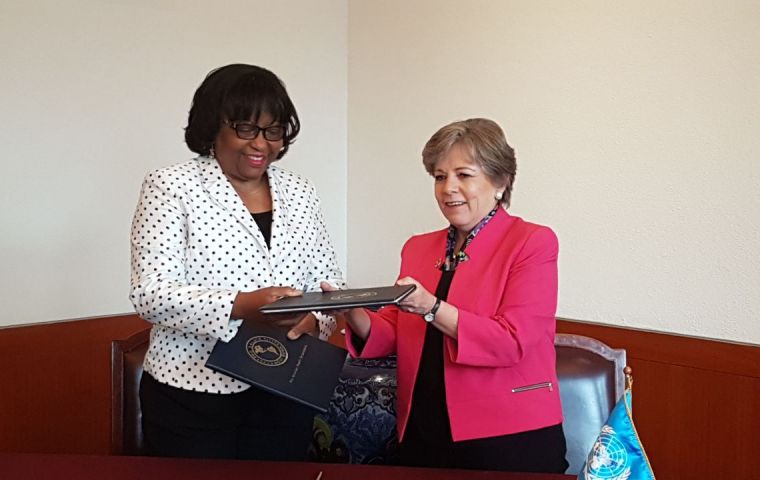MercoPress. South Atlantic News Agency
PAHO/ECLAC report on Covid-19 exposes the fragility of Latin America's health systems
 The health crisis report and its impacts on the economy and social development was presented Carissa F. Etienne, PAHO Director, ECLAC's Alicia Bárcena
The health crisis report and its impacts on the economy and social development was presented Carissa F. Etienne, PAHO Director, ECLAC's Alicia Bárcena In n a new joint report released the Pan American Health Organization (PAHO) and the Economic Commission for Latin America and the Caribbean (ECLAC) urge the governments of the region to accelerate vaccination processes and improve health systems.
There is an urgent need to transform health systems, strengthen public investment and consolidate their welfare states, among other measures, to control the health crisis in the short term and move towards a transformative recovery with equality and environmental sustainability, in line with the Sustainable Development Goals (SDGs).
“The pandemic has highlighted the need to formulate a public health agenda with a comprehensive and integrated approach in Latin America and the Caribbean, which recognizes the interdependence of the health, social, economic and environmental dimensions,” states the document - “The prolongation of the health crisis and its impact on health, the economy and social development”, released at a press conference by Carissa F. Etienne, Director of PAHO, and Alicia Bárcena, Executive Secretary of ECLAC.
The COVID-19 pandemic has claimed just over 1.5 million lives in Latin America and the Caribbean, with more than 45.7 million cases confirmed since its outbreak in the region in February 2020. The region accounts for nearly one-fifth of all confirmed cases of COVID-19 worldwide and about 30% of all related deaths, despite having only 8.4% of the world’s population.
In 2020, the health crisis sparked the most severe economic contraction of the past 120 years in Latin America and the Caribbean, which also saw the worst economic performance of all the developing regions. The region’s near-zero growth in the five years before the crisis, coupled with the sharp contraction in 2020 (-6.8%), resulting in a record drop in employment and an unprecedented rise in unemployment, along with sharp increases in poverty, extreme poverty and inequality, all of which has further exacerbated the region’s structural problems. Growth is expected to average 5.9% in 2021, and 2.9% in 2022. However, this expansion will not be enough for the region as a whole to regain its pre-crisis GDP levels.
“Together with the structural weaknesses of the region’s health systems that hinder their ability to deal with the pandemic, the prolongation of the health crisis is closely related to the slow and uneven progress of vaccination campaigns in the region and the difficulties that countries have had to maintain social and public health measures at adequate levels,” the report says. On average, 39% of the population of Latin America and the Caribbean is fully vaccinated. Although countries such as Uruguay achieved a 70% vaccination rate, 25 out of the region’s 49 countries and territories have less than 40% of their total population fully vaccinated.
The document stresses that the persistence of the crisis has laid bare the need to transform health systems in Latin America and the Caribbean, which even before the pandemic were characterized by the weakness of health services’ response capacity, their fragmentation, segmentation and underfunding – with spending levels far below the regionally agreed threshold of 6% of GDP. ECLAC and PAHO warn that these conditions are the structural causes of inequalities in access to health services and the persistence of high out-of-pocket spending. The two agencies report that “socioeconomic vulnerability is highly correlated with the severity of COVID-19 infection and mortality.”
Similarly, the shortfalls in public investment in the region’s health systems translate into weakness in the stewardship of health authorities, a relative shortage of human resources in the health professions – with 20 physicians available for every 10,000 inhabitants in the region on average, far below the parameters recommended by the World Health Organization (WHO) – and limitations in the capacity of health service networks to resolve problems, particularly at a primary care level.




Top Comments
Disclaimer & comment rulesCommenting for this story is now closed.
If you have a Facebook account, become a fan and comment on our Facebook Page!